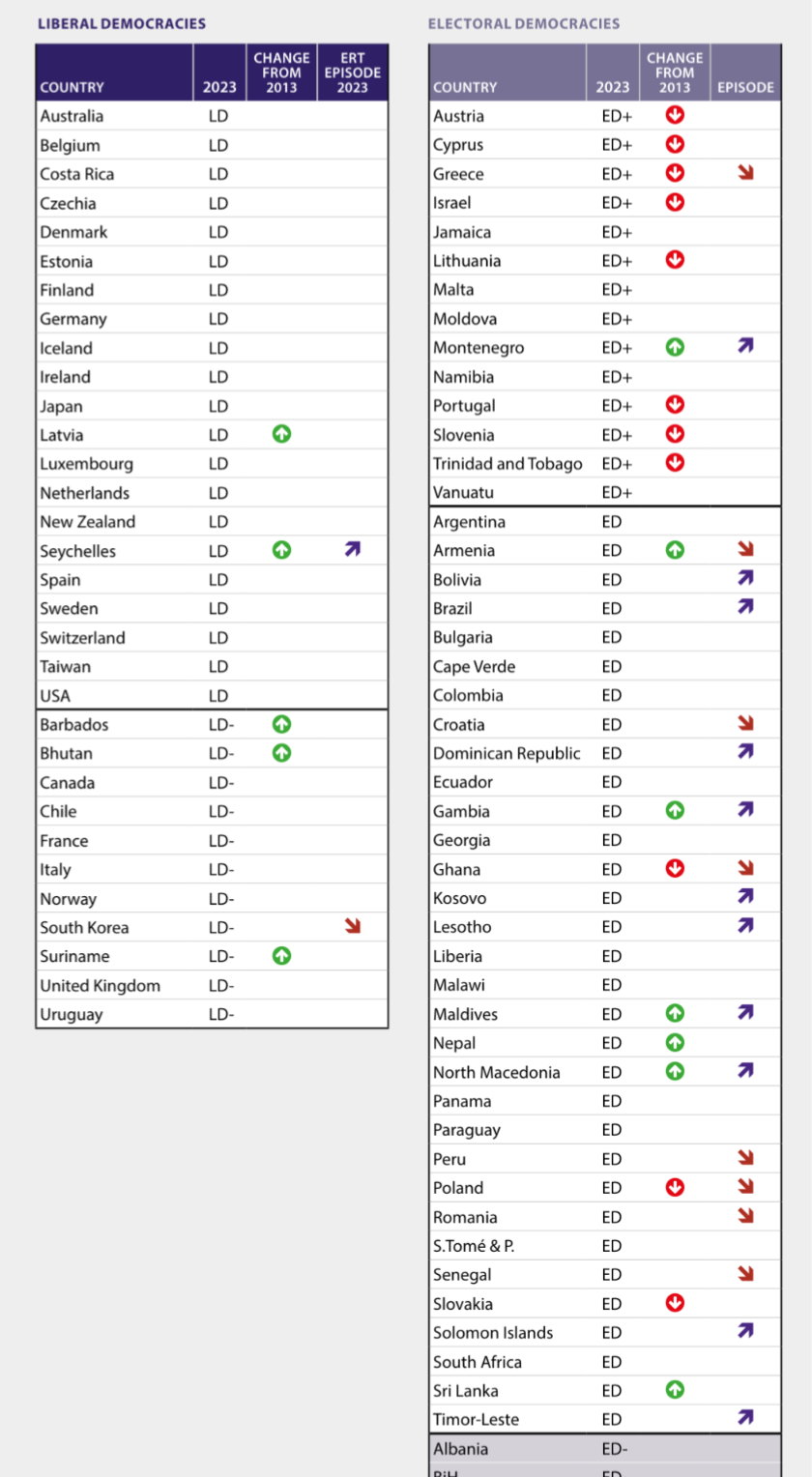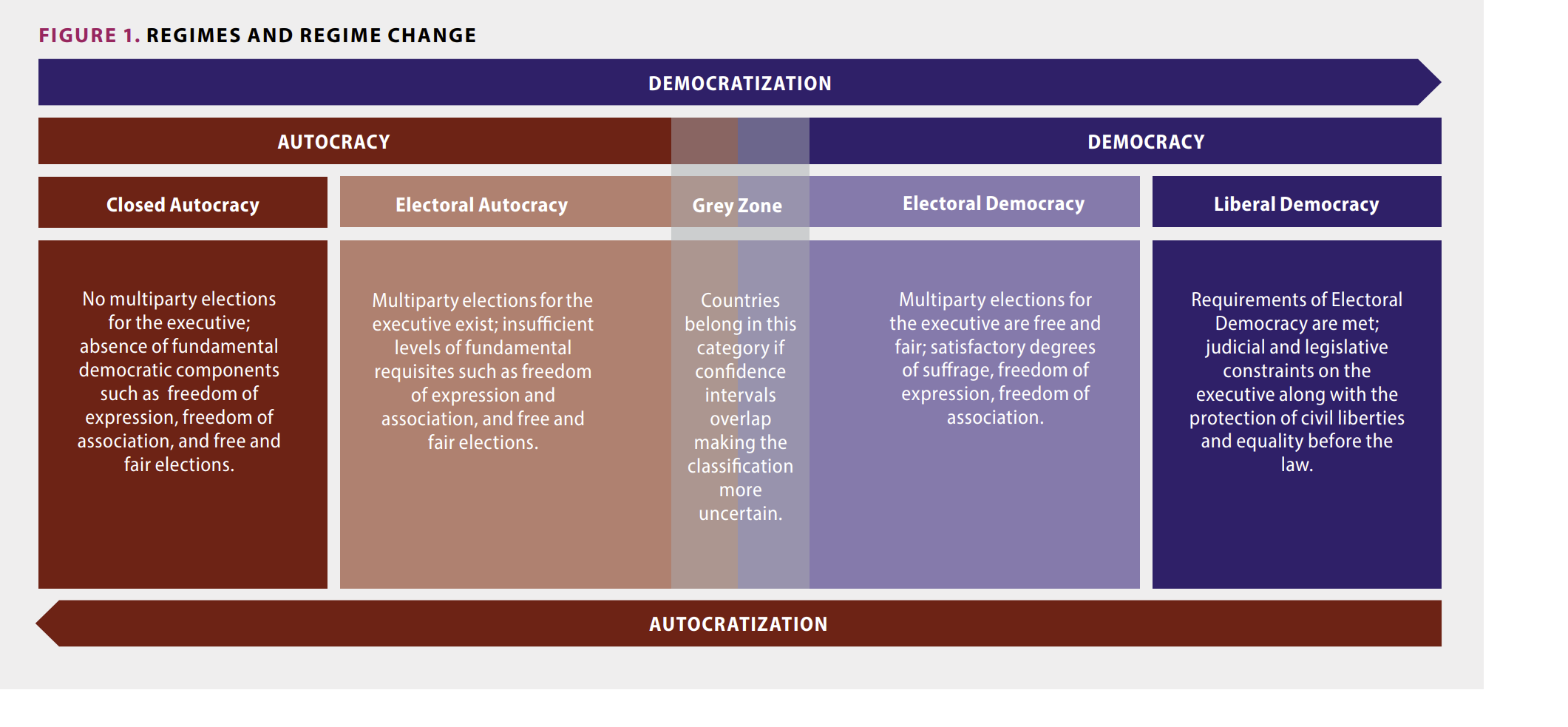
This will be resolved based on the first V-DEM report after his term (i.e. March 2029), which collects data up to and including 2028.'
If Trump is not elected in 2024, this market will close NA (all mana returned).
Companion question:
@DavidFWatson yeah it's annoying that it's not clear-cut whether a 2029 report would update based on a pro-democratic president taking power in 2029. Normally they finish the surveying the year before.
I might make a new question that asks if any of the interim V-DEM reports mark the US as anything other than a liberal democracy
Folks, this really seems relevant:
https://apnews.com/article/trump-kimmel-abc-suspension-media-pressure-kirk-eb4f0fcd38499e37c94613fe8bd8e9c6
@DavidFWatson "Liberal Democracy" in the V-DEM measurement requires both free/fair elections and standard constraints on executive power along with rule of law and robust protections for civil liberties like freedom of expression and association. The administration's actions this week, from using the FCC to pressure broadcasters to labeling political opposition as "terrorist networks," represent observable attacks on these exact liberal components. It seems plausible that the US could be downgraded to 'Electoral Democracy' on these events alone.
@Siebe That’s funny because their first map in said report seems to put it in in ED+ colour. Perhaps my phone is not displaying the colours right.
@traders I have made a dashboard for US Democracy questions:
https://manifold.markets/news/us-democracy?r=U2llYmU
Let me know if you want to see any questions added or created
Just spitballing a less subjective definition of liberal democracy:
"If Trump is elected, averaged over the time period of January through October 2028, will there be a >20% of a Democrat or other GOP-opposed party being installed as president in 2029."
@GG What if everyone just really loves Trump?
Like, I don't expect his admin to be super effective, but if it was and the whole minority vote flipped or something and then Kamala ran again this would qualify
@GG this would be a very low bar and wouldn't be a good measure for liberal democracy. It would measure electoral democracy , but 20% would be so low that even some electoral autocracies might come close

@Siebe V-DEM seems to be using a different definition of autocracy than I see on the dictionary websites. V-DEM seems to define autocracy as a lack of elections and individual freedoms:

Whereas most definitions define autocracy in terms of having lots of concentrated power

I agree that a country where the regime has a 20% chance of losing power soon is not necessarily a liberal democracy. But I do think that a regime with a 20% chance of losing power soon is necessarily-not-an-autocracy, at least when we use the "centralized power" definition of the word "autocrat."
Consider a country in the midst of a civil war, where territory changes often and its never clear which side is on top. Such a country would not be a democracy, since it does not hold elections. But it's also not fair to call it an autocracy, since neither side has consolidated power.
So, back to Trump, you could argue that the fact that Republicans don't have a lock on the 2029 White House is not necessarily an argument that America is a liberal democracy. But I do think it's solid evidence that Trump is not an autocrat, and the markets do not expect him to be an autocrat, at least when you define autocrat as "holding almost all of the power."
@GG good points about the shortcomings of V-DEM's autocracy definition. But you don't respond to my point which is about the distinction between a liberal democracy and electoral democracy. In a liberal democracy, rights of minorities are safeguarded, opposition & criticism are tolerated and protected, power is checked by independent judiciary, and there's a free independent press. In electoral democracy, there substantial chance of power changing hands via elections, but much fewer of those things I mentioned above.
This forecasting question is "will the US be an autocracy?" It's "will it still be a liberal democracy?"
@Siebe but as I've said before, I think the 20% is a decent threshold but measures a different question, and I also acknowledge the issues of V-DEM but I can't change it now
Some useful comments on the subjectivity of V-DEM:
If anyone has suggestions for a better measure, I'd love to make a new question for it

@Siebe
This market attempts to reduce to subjectivity of "liberal democracy" by asking whether we expect GOP to have what I call "real control" of the White House in 2029. (Feel free to suggest a better term.)
Answer 1 resolves YES if GOP, through legitimate or illegitimate means, maintains control of the White House through January 2029. Real control happen by winning the 2028 election legitimately, or through illegitimate means like refusing to certify the 2028 election. While I fully expect the losing side in 2028 to claim that they "really won", it should be fairly obvious which side actually holds White House power.
Answer 2 asks if we will expect Answer 1 to average more than 80% over the month of January 2028. This answer provides something an upper bound for the probability of authoritarianism: if the opposition party has more than a 20% chance of taking power next year, the ruling party cannot be said to have authoritarian control.
Answer 3 is used to estimate the opportunity cost of locking your money up in Answer 2.
Do you have any suggestions for improving or fixing this market?
@GG UK elections, 1 year in advance had Labour at 77% on Metaculus. But I think it's different for the challenger to be so high than for the incumbent.
https://www.metaculus.com/questions/11780/party-leaders-form-government-uk-election/
Yes there's a bit of a challenge in determining how firmly you have a lock on power before you can be called an autocrat. If you set the bar too high, you may exclude certain parties that could plausibly be called autocracrats (ex Nicolas Maduro). But if you set the bar too low, it could include parties that are not autocracies, like the UK Labour party. So 80% is kind of a compromise. Could add multiple options though, like 80%, 90% and 95% thresholds.
Thank you for reviewing my market!
I made this market last week, just poured some boosts and liquidity into it. https://manifold.markets/GG/regardless-of-elections-will-actual#hjzwzmwozz
I originally intended to make some derivative markets about whether power will change hands but it hasn't proven very popular yet.
Hi everyone, I would like to change the resolution criteria to 'the first V-DEM report after his term (i.e. March 2029), which collects data up to and including 2028.'
I think this would be far more in line with the spirit of this question, and would capture any antics with the 2028 election, which is a big factor. Do people agree with this change?
